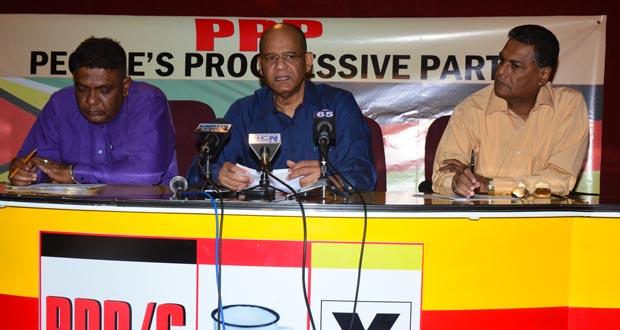Rohee says Opposition is biggest impediment to economic development – as PPP/C lauds Guyana’s economic success
By Vanessa Narine, Wednesday, 8 January 2014, Source
GUYANA has recorded an average five per cent growth in the economy, the highest in the Caribbean Region; and General Secretary of the People’s Progressive Party, Mr Clement Rohee, yesterday congratulated the Government on attaining this level of growth in the face of global economic realities and regional and local factors.
The PPP General Secretary, however, slammed the Opposition as the “greatest impediment to economic development and social progress” in Guyana.
He said: “Unfortunately, (there) continues to be the joint opposition in the National Assembly. They slashed $19B and $32B from the 2012 and 2013 Budgets respectively, thereby depriving the economy of nearly $51B that would have been spent, and from which the Guyanese people would have benefited.
“They have voted down massive foreign-funded capital projects, such as the Cheddi Jagan Airport Expansion Project, the specialty hospital, the Amaila Falls (Hydro power) project, hinterland airstrips expansions and renovations, etc.”
Rohee said the Government has had to make use of constitutionally enshrined powers and other methods to restore the projects. However, months elapsed before this was done, depriving the economy of these massive financial injections.
“The Amaila Falls Hydro Project was killed completely!” he said. “The capital cost of this singular project was 25 percent of the size of our economy.”
He added that the approach of the Opposition in not supporting these projects — particularly those involving international financiers and contractors — continues to “tarnish and besmirch” Guyana’s image as an investment destination.
“This is an image that we took nearly two decades to create,” he said. “Investors are no longer as willing to invest as they were before. Muri Brasil pulling out is a good example.”
Rohee also referred to the Opposition parties’ stance on the Anti-Money Laundering and Countering the Financing of Terrorism (AML/CFT) Bill, which was returned and is currently before a Parliamentary Select Committee. “The economic consequences of this blacklisting are now being felt; and from all indications, they will gravely affect the economic trajectory of our country,” he said.
Rohee mooted that Guyana might have progressed further economically had the Opposition been “progressive, responsible and patriotic” in their approach to politics, rather than being “spiteful economic saboteurs who are masquerading” as political leaders.
He also acknowledged that greater progress, and hence prosperity, had been adversely affected by globalization and the adverse weather conditions affecting the agriculture sector’s productivity.
However, he lauded the Government’s diversification drive. Rohee said: “This (diversification) has minimised our dependence on a few industries, rendering our economy more robust and resilient. While we faltered in sugar, rice and gold recorded the highest production in our history. Tourism continues to grow, and our records of visitors remain one of the highest in the Region for 2013.
Construction continues to boom (and) information technology (ICT) remains one of the fastest growing areas in our new and emerging sectors.
“So while the Government has had to grapple with all these challenges, farmers, miners and workers right across the divide have stood by our side to achieve the phenomenal performance which our country has recorded.”
CONTEXTUAL CONSIDERATION
Rohee also called for the performance to be considered in a broader context in order to engender appreciation for Guyana’s success.
He said: “It is necessary that we examine this achievement against global economic realities as well as regional and local factors, all of which conspire in having an impact on our economy.
“It is a fact of notoriety that the world economy was plunged into its worst economic recession in recorded history approximately five years ago. Presently, while there have been some discernible improvements, many of the major economies — especially in North America and Europe — continue to reel from the impact of the recession. They continue to endure negative economic growth, with the attendant social repercussions which are the natural consequences of economic stagnation. Unemployment, inflation, debts, crime and poverty remain high; while income, social benefits and job creating opportunities remain low.
“The impact of this in the CARICOM Region, largely made up of small economies that are heavily dependent on tourism coming from these erstwhile powerful economies now in recession, (has) been devastating.”
Rohee said the economies of the Eastern Caribbean countries have been forced to seek balance-of-payments support to sustain basic social services to their people and to pay public servants’ wages.
“Last year Jamaica enlisted IMF (International Monetary Fund) support to fund its budget. The oil-rich Trinidad and Tobago is experiencing full employment with negative economic growth. Barbados was forced to announce recently that 3,000 public servants are likely to be laid off, along with a devaluation of the nation’s currency,” Rohee said.
He stressed that the entire CARICOM Region is in dire economic straits, and reiterated that it is against this background that Guyana’s eight years of consistent economic growth must be viewed, particularly with 2013’s five percent being the highest.
“Only then one gets an accurate picture of how well we have done,” Rohee said, as he called attention to the local factors that have contributed to Guyana’s success.
He said: “Indeed, our achievement has been publicly recognised and acclaimed by political leaders in the Region, regional commentators and the international financial institutions. It is imperative also that we examine certain local factors which have had an impact on the Guyanese economy.”

From left are Zulfikar Mustapha, PPP General Secretary Clement Rohee, and Mr Manzoor Nadir



